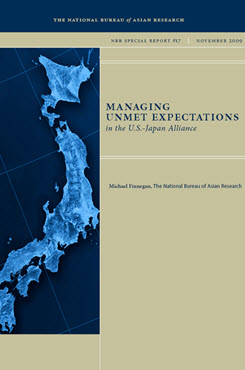NBR Special Report no. 17
Managing Unmet Expectations in the U.S.-Japan Alliance
This report examines the U.S.-Japan alliance to answer three related questions: Is the alliance meeting the mutual expectations of the partners? If not, what are the potential consequences? Given the stakes involved, what are the policy implications for the alliance?
EXECUTIVE SUMMARY
MAIN ARGUMENT
The alliance is failing to meet the expectations of both the U.S. and Japan in significant ways. For the U.S., the continuing inability of the alliance to operationalize itself in the core mission of the defense of Japan as well as to be operationally relevant in the region remain the key failings. For Japan, the primary growing concern is the U.S. meeting and sustaining commitments to the defense of Japan, including extended deterrence. At base, both partners have reasonable reasons to feel their core expectations are not being met nor will be met by the current trajectory. Thus, despite public statements about strength, the alliance is actually quite brittle precisely at a time when both allies are perhaps depending on it more than ever. In a crisis the exposure of the alliance’s inability to meet key expectations is likely to engender a subsequent significant and deal-breaking breakdown of confidence, leading one or both partners to consider alternatives beyond the current configuration.
POLICY IMPLICATIONS
- The efforts of alliance leaders to sustain the alliance “as is” put both nations at risk. The allies must develop a more sustainable set of expectations to form the basis of the alliance.
- Current efforts of policymakers to strengthen, deepen, or broaden the alliance fall short and in meaningful ways distract the allies from meeting the central expectation of the alliance—the defense of Japan.
- Leaders must recognize that both countries have several alternatives to the current alliance relationship, which although carrying significant downsides, must be considered in policy calculations.
- Policy leaders should consider implementation of a new “grand bargain” on Japanese defense, wherein the primary focus of the alliance reverts to the defense of Japan, Japan assumes primacy in this area, and newly clarified U.S. support commitments are met.


